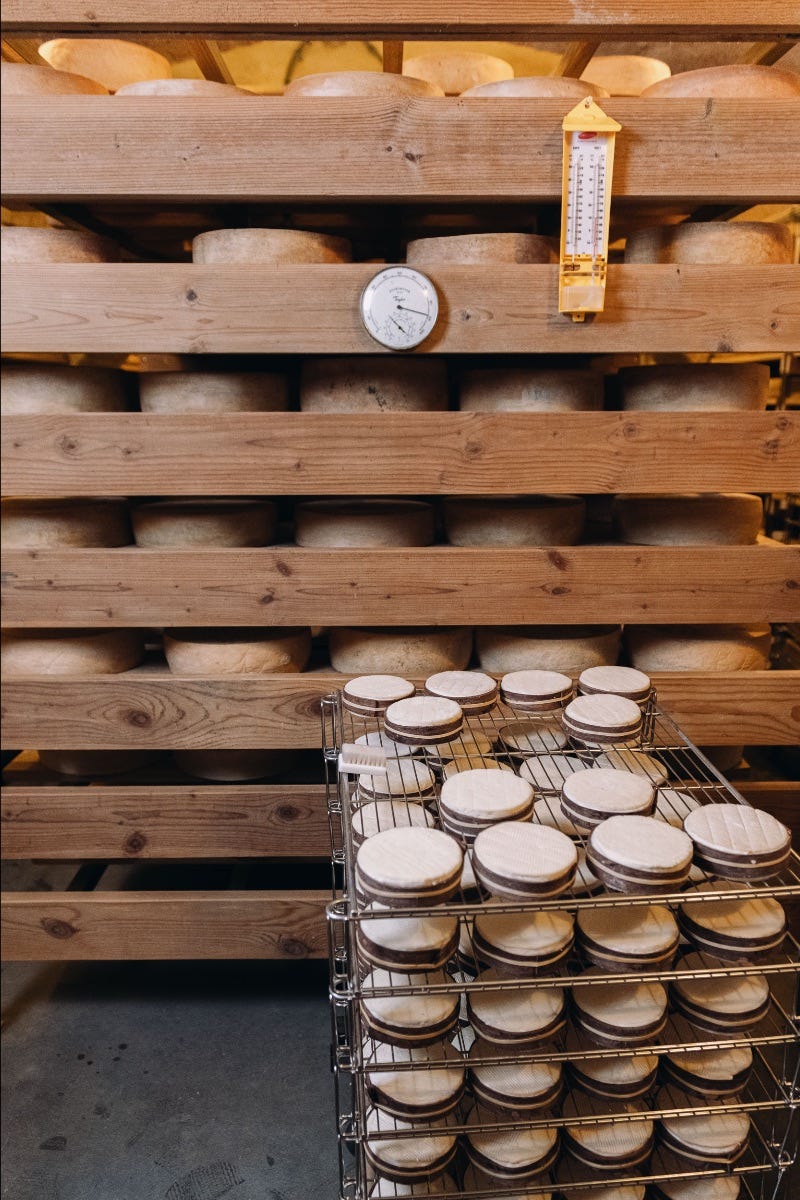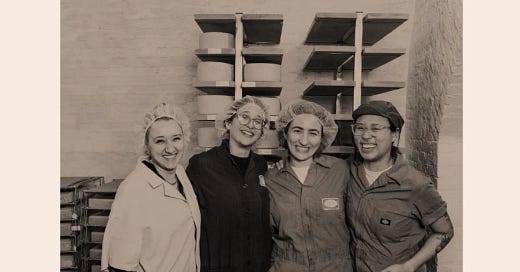Aging Cheese in the Middle of Brooklyn? Yes, Crown Finish Caves Is for Real

The Deligram is an ode to the artisanal food makers of New York. In our last issue, we spoke with Wandel founder Stephanie Berlin, who runs a mandel bread business. This week, we are chatting with Crown Finish Caves owner Benton Brown about the Crown Heights, Brooklyn, affinage, or cheese aging facility, he opened in 2014 with his wife, Susan Boyle.

The Product: Thoughtfully sourced artisanal cheeses aged to perfection.
The Deli Pick: Mixed Signal, a clothbound cheddar-style cheese made at Grafton Village Cheese Company that is aged for 5 months.
How To Buy: Order online at crownfinishcaves.com for in-store pickup and shipping on orders over $75, or purchase at your local retailers.
Price: $25/pound.



In 2001, around September 11th, my wife Susan and I went through a series of options to buy this old brewery property from the Nassau Brewing Company complex. We quickly sold off half of it and now we’re just the red building next to the train on Dean Street and the red building next to the train on Bergen Street, with tunnels underneath both properties. Once we were done renovating both projects, it was time to address the tunnels. We’re both heavy cheese lovers; I wanted to learn how to make cheese, this seemed like a great place to make cheese. I was very wrong about that. I took some courses up in Vermont with Peter Dixon that led me to learn more about aging, which suited my history as an artist–I showed in galleries and did all that, but became very disgusted with the art world [laughs]. The creativity and the art of aging cheese was very in-line with my way of thinking. I went up to Jasper Hill in Vermont, went to London, went to France and worked with Hervé Mons in his caves, to get a better understanding of the process of receiving, aging, and selling cheese.
Around 2012 we started to develop one of the tunnels into an aging facility and then we got our license in 2014, as a New York State licensed dairy plant. Food safety is very intense [in the U.S.]. It’s very hard for smaller dairies to operate, because you have to have the time and money to keep such rigorous food safety plans. When we set out on this path, the vision was to support smaller farms that were getting pushed out. We quickly found that that was much more difficult because of food safety [regulations], which led us to work with larger farms. A lot of these larger farms buy milk through cooperative milk sourcing, so there are smaller farms that provide milk to those cooperatives. In the end maybe it’s not a [smaller] cheesemaker who’s providing us with young cheese, but [we’re supporting] a smaller milk source who handles the herd, milks the animals.



The aging side of this – that’s the bottleneck for growth for some of these farms. A lot of times producers have ideas they’re excited about trying, or that they wish they could make something in their facility but don't want to disrupt their processes. The art of aging cheese is, you have to be with the cheese. You have to use all your senses – it’s all about touching and smelling and tasting to know when something’s ready or is on track to be a good cheese. It’s a mix of science and creativity for sure, which is what drew me into it. You have a foundation of why something would turn a certain direction, but there’s also never-ending experimentation.

Part of the original vision was, we can bring chefs over, do custom things for them, they can choose the cheeses they want for their restaurant, the actual wheel they want…So there’s this opportunity to work closer with the end source of where things might go.
It’s been a tricky past two years. It’s not a place where you can work from home – the cheese has to be tended to, has to be sold, has to run through a whole system where people [need to be there]. It’s been a rough ride. But we have the opportunity to grow. [Before COVID,] we were running a music series called Cave Music. It was this 100-seat music event with cheese and beer in this unfinished, very romantic cave. There’s talk of that coming back. With COVID still floating around it’s hard to make plans. But we are starting a pop-up every Friday from 3-6 p.m. over the next couple of months to see how that goes. We’re going to have some fun wildcard cheeses we’ve been working on that will only be at the pop-up.


Greatest hit: There's [the Treeline], a raclette style cheese that we're getting from a maker named Chris Roelli in Wisconsin. We also have a great aged goat cheese that's made in Maryland called Carpenter’s Wheel.
Most underrated product: We have a special cheese that we used to make only for Whole Foods called Windham. It’s one of our cheaper cheeses, a natural rind cheddar that’s aged for three to four months – it’s good entry point for getting into natural rinds.
How to best enjoy your products: I like to have cheese with bourbon, Basil Hayden or any Kentucky bourbon works. Sometimes I enjoy straight up cheese – I’m not really a cracker person, and I love bread but I don’t need it with my cheese.
Favorite restaurants to eat in NY: One of my favorites is Diner. I was going there when they first opened long ago. I know I’m going to be happy when I go there. I love Saraghina as well. And I’m very interested to go to Gage & Tollner – we sell them cheese and they have an amazing pastry chef over there, Caroline Schiff.
Food makers to follow: Eleanor from La Salumina, our neighbors at Minnow, and Australian chef Colin Wood.





